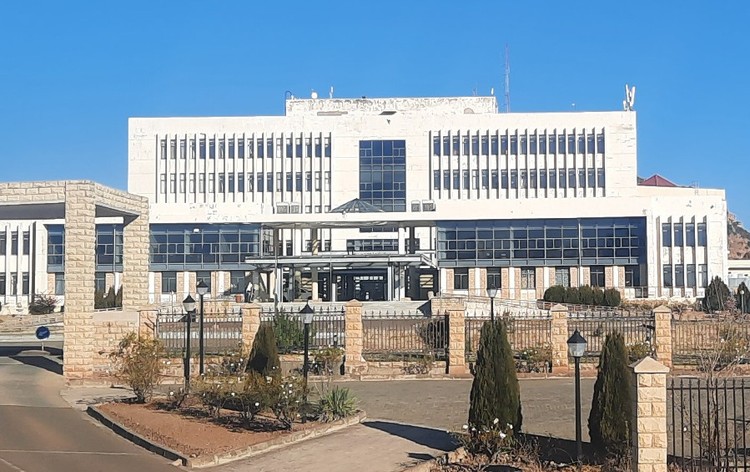Lesotho workers condemn denial of healthcare to Basotho in South Africa
Lesotho cabinet ministers to engage with SA counterparts over the issue
Lesotho’s Parliament buildings in Maseru. Photo: Sechaba Mokhethi
- The Migrant Workers Association of Lesotho says Basotho nationals in South Africa are being denied medical care at clinics and hospitals.
- The association warns that denial of care is undermining Lesotho’s efforts to combat HIV in the region.
- The association called on the Lesotho government to take urgent action.
- The Lesotho cabinet has instructed its ministers for foreign affairs and home affairs to engage with their South African counterparts.
The Migrant Workers Association of Lesotho has condemned the denial of healthcare services to Basotho migrants living in South Africa, saying it is a violation of their human rights and international law.
In a statement on Tuesday, the association’s executive director, Lerato Nkhetše, said the refusal to treat Basotho, especially in Gauteng, where migrants are reportedly blocked from accessing medical care at clinics and hospitals unless they produce South African IDs, is a violation of their right to health.
Speaking to GroundUp, Nkhetše said the association was compelled to speak out after receiving over 60 reports from members who were denied access to clinics and hospitals, mostly in Soweto.
“We receive alerts from our WhatsApp groups for different provinces, where members post about what’s happening in their areas. It became clear the issue was widespread and serious,” he said.
Nkhetše said women are the most affected, as they make up the majority of Basotho migrants in South Africa and are more likely to seek medical services and follow up on treatment.
“Denying healthcare to Basotho immigrants not only inflicts harm on individuals [and] undermines the core principles of human dignity and equality that are non-negotiable in any just society,” Nkhetše said.
He called on authorities in both Lesotho and South Africa to investigate the violations, hold those responsible accountable, and implement measures to ensure immediate and equitable access to healthcare for all Basotho living in South Africa.
While South African President Cyril Ramaphosa and several human rights organisations have condemned such xenophobic actions – often carried out by members of Operation Dudula – Nkhetše expressed disappointment with Lesotho’s own Parliament, particularly when a request for an urgent debate on the issue was rejected.
On Monday, Professor Nqosa Mahao, leader of the Basotho Action Party, made a special appeal to the Speaker of the National Assembly, Tlohang Sekhamane, for Parliament to discuss the situation. Sekhamane declined, arguing that allowing the request without evidence would “set a bad precedent”.
In response, Nkhetše said, “We wonder what evidence is needed when the situation is all over the media, with videos and reports of non-South Africans being expelled from clinics.”
He said the Lesotho government needs to act urgently, suggesting that Lesotho embassies and consulates in South Africa should be equipped with permanent clinics for Basotho.
“If riots like those led by Operation Dudula occur, at least our people would have a place to run to for healthcare. Even if the consulates are far, it’s still better than travelling all the way back to Lesotho,” he said.
Nkhetše warned that the current situation could seriously undermine Lesotho’s efforts to combat HIV and other public health crises.
“In Lesotho, many clinics are reporting rising numbers of defaulters because patients collect medication in South Africa. If they are turned away there, they simply stop taking their medication,” he said.
Lesotho ministers to engage with South Africa
Last week, while briefing the media on cabinet decisions, Minister of Communications Nthati Moorosi confirmed that the issue had reached the highest levels of government. She stated that the cabinet had instructed the Minister of Foreign Affairs and the Minister of Home Affairs to initiate negotiations with their South African counterparts.
“We have seen videos of South Africans physically removing non-citizens from clinics and hospitals. It puts us as the Basotho nation in a very difficult position,” Moorosi said.
She noted that South Africa had recently agreed to allow Basotho to stay in the country for up to 90 days.
Moorosi said, “Our plea is simple. If you give Basotho citizens permission to be in South Africa lawfully, then you must also allow them access to essential services like healthcare. Otherwise, what message are we sending?”
She called for an immediate end to discriminatory practices in South African health facilities. “Access to healthcare is a human right, wherever you are.”
Support independent journalism
Donate using Payfast

Don't miss out on the latest news
We respect your privacy, and promise we won't spam you.
Next: Nelson Mandela Bay’s failed multi-billion-rand bus service
Previous: More than 80 to a class at Elim High
© 2025 GroundUp. This article is licensed under a Creative Commons Attribution-NoDerivatives 4.0 International License.
You may republish this article, so long as you credit the authors and GroundUp, and do not change the text. Please include a link back to the original article.
We put an invisible pixel in the article so that we can count traffic to republishers. All analytics tools are solely on our servers. We do not give our logs to any third party. Logs are deleted after two weeks. We do not use any IP address identifying information except to count regional traffic. We are solely interested in counting hits, not tracking users. If you republish, please do not delete the invisible pixel.

